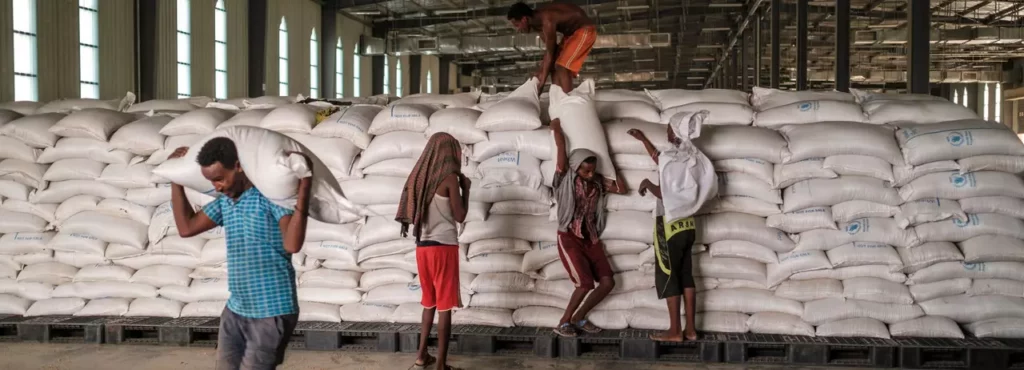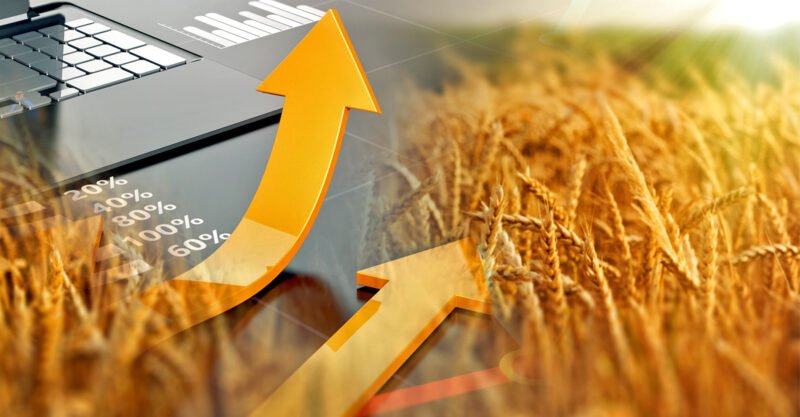‘Disaster Capitalism at Its Worst’: Profits of Grain Giants Spark Global Criticism
CAPITALISM, 29 Aug 2022
Jessica Corbett | Common Dreams - TRANSCEND Media Service
As 345 million people suffer from acute food insecurity, the four corporations that control virtually all grain trade stuff their pockets with cash, pop the champagne corks, and laugh all the way to the bank. “As a short-term measure there are strong arguments for a windfall tax on the food oligopoly.” — Natalie Bennett, U.K. Green Party Peer

Workers carry sacks of grain in a warehouse of the World Food Program in Abala, Ethiopia on June 9, 2022.
(Photo: Eduardo Soteras/AFP via Getty Images)
23 Aug 2022 – “Oligopoly in action.”
That’s how Kartick Raj, a Human Rights Watch researcher focused on poverty and inequality in Western Europe, responded Tuesday to The Guardian’s new reporting on the world’s four grain giants raking in record profits — which is fueling calls for a global windfall tax.
“The fact that global commodity giants are making record profits at a time when hunger is rising is clearly unjust.”
After noting United Nations agencies’ estimates that while about 345 million people endure acute food insecurity — up over 200 million from before the COVID-19 pandemic — food prices have skyrocketed by over 20%, journalist Fiona Harvey highlighted remarks from Olivier De Schutter, a co-chair of the International Panel of Experts on Sustainable Food Systems and U.N. special rapporteur on extreme poverty and human rights.
“The fact that global commodity giants are making record profits at a time when hunger is rising is clearly unjust, and is a terrible indictment of our food systems,” he told Harvey.
“What’s even worse, these companies could have done more to prevent the hunger crisis in the first place.”
As Harvey explained:
“Four companies — the Archer-Daniels-Midland Company, Bunge, Cargill, and Louis Dreyfus, known collectively as ABCD — control an estimated 70-90% of the global grain trade. ‘Global grain markets are even more concentrated than energy markets and even less transparent, so there is a huge risk of profiteering,’ said De Schutter.
“He said this year’s food price surge happened despite what are thought to be abundant global grain reserves, but there was insufficient transparency from the companies to show how much grain they hold and no way to force them to release stocks in a timely way.
“‘We need to be looking at the grain giants and asking what they could have done to avert the crisis, and what they could be doing now,’ De Schutter said.”
While the four companies declined to respond to Harvey’s request for comment, De Schutter added that:
“Ultimately, we need to break up the monopolies that have a stranglehold on the food chain. A handful of companies control global seed and fertilizer markets, animal genetics, the global grain trade, and food retail. They are making huge profits at the cost of farmers, consumers, and the environment.”
Using a term coined by author Naomi Klein, U.K. climate scientist Bill McGuire declared in response to Harvey’s article: “Disaster capitalism at its worst.”
“As 345 million people suffer from acute food insecurity,” McGuire continued, “the four corporations that control virtually all grain trade stuff their pockets with cash, pop the champagne corks, and laugh all the way to the bank.”
Nick Dearden, director of the U.K.-based group Global Justice Now, similarly said that “food monopolies rake in bumper profits as speculation drives up food prices. We have enough food for everyone, but the financial markets dictate more and more people must go hungry to fill the coffers of the super wealthy.”
Record profits for grain firms amid food crisis
Record profits for grain firms amid food crisis
Record profits for grain firms amid food crisis
Record profits for grain firms amid food crisis
Record profits for grain firms amid food crisis
Record profits fhttps://t.co/CBWaTjKKrQ— Michael Galant (@michael_galant) August 23, 2022
“Workers wages aren’t causing our #CostOfLivingCrisis. Profiteering is. Want proof?” UNI Global Union tweeted, pointing to Harvey’s reporting, which detailed some of what’s fueling the current issues, including Russia’s war on Ukraine.
The U.K. group Plan B Earth took aim at government leaders:
“Bonanza for fossil fuel companies, while people can’t pay their bills. Soaring stocks for defense companies on the back of war. And while famine stalks East Africa and Afghanistan, food companies make record profits. None of us voted for this!”
As Common Dreams reported in June, Oxfam has spent the summer pushing for a windfall tax targeting major companies.
Harvey noted Tuesday that some campaigners and political figures have echoed that demand, including Natalie Bennett, a U.K. Green party peer, who said that:
“As a short-term measure there are strong arguments for a windfall tax on the food oligopoly — the handful of companies, with significant cross-ownership from hedge funds, that from seeds to supermarkets are major contributors to the inflation that’s driving the cost of living crisis to new heights.”
____________________________________________
Jessica Corbett is a staff writer for Common Dreams.
Our work is licensed under Creative Commons (CC BY-NC-ND 3.0). Feel free to republish and share widely.
Go to Original – commondreams.org
Tags: Big Food, Capitalism, Corruption, Elites, Finance, Grains, Greed, Hunger, Inequality, Post-capitalism, Profits, Right to Food, Super rich, Ukraine, World Order
DISCLAIMER: The statements, views and opinions expressed in pieces republished here are solely those of the authors and do not necessarily represent those of TMS. In accordance with title 17 U.S.C. section 107, this material is distributed without profit to those who have expressed a prior interest in receiving the included information for research and educational purposes. TMS has no affiliation whatsoever with the originator of this article nor is TMS endorsed or sponsored by the originator. “GO TO ORIGINAL” links are provided as a convenience to our readers and allow for verification of authenticity. However, as originating pages are often updated by their originating host sites, the versions posted may not match the versions our readers view when clicking the “GO TO ORIGINAL” links. This site contains copyrighted material the use of which has not always been specifically authorized by the copyright owner. We are making such material available in our efforts to advance understanding of environmental, political, human rights, economic, democracy, scientific, and social justice issues, etc. We believe this constitutes a ‘fair use’ of any such copyrighted material as provided for in section 107 of the US Copyright Law. In accordance with Title 17 U.S.C. Section 107, the material on this site is distributed without profit to those who have expressed a prior interest in receiving the included information for research and educational purposes. For more information go to: http://www.law.cornell.edu/uscode/17/107.shtml. If you wish to use copyrighted material from this site for purposes of your own that go beyond ‘fair use’, you must obtain permission from the copyright owner.

